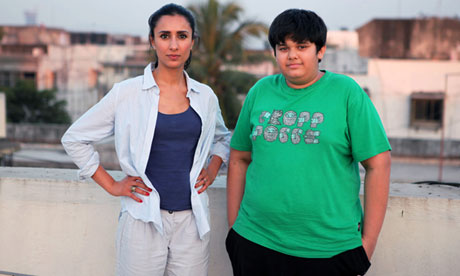
In the US and the UK, it's working-class kids who tend to be on the wrong end of the obesity epidemic with too much junk food and not enough exercise. In India it's a problem largely confined to the middle classes though, as India's Supersize Kids (BBC2) made clear, the root causes are much the same: sedentary lifestyle – middle-class families often have so many staff that the only finger a child needs to raise is the one attached to a fork – and a fondness for KFC and McDonald's. The difference being that in India fast foods are a symbol of wealth rather than poverty, as a Big Mac costs more than many Indians earn in a day.
Had Anita Rani's film pursued this line of argument as vigorously as her camera crew followed overweight teenagers into the operating theatre to film their gastric-band procedures, then it might have been a useful piece of investigative journalism. But having pointed the finger at KFC, McDonald's and several other international fast‑food giants that are serving up far less healthy meals in India than they are now obliged to offer in their western outlets, Rani rather let them off the hook.
She made no attempt to challenge anyone from KFC or McDonald's about their marketing or social responsibility strategies; instead she chose to pick on a local Indian entrepreneur who had set up about 25 McDonald's lookalike franchises and appeared to regard her questions as more of an advertising opportunity for his business than a critique of his products' nutritional values. As it was then, Rani's film fell between two stools: unable to decide whether it was a proper Panorama‑style report or a Channel 5 "Wow, look at the state of those kids. They're enormous" piece of sensational voyeurism.
Most of the children on view were indeed enormous, but they were rather less interesting than their parents, almost none of whom gave any impression they felt any responsibility for their child's weight. Or health. It was almost as if the weight gain was something abstract that was being done to their child by an outside agency over which they were powerless. If they had tried to educate their children to eat better, restrict their access to fast-food outlets or explore what was making them compulsively overeat, Rani's film didn't tell us. Is surgery really the first port of call for India's Supersize Kids? Or does it just make a better documentary?
Parental responsibility was also the subtext running through You're Killing My Son: The Mum Who Went on the Run (Channel 4). Late last year, Sally Roberts became a news story when she went into hiding with her seven-year-old son, Neon, because she didn't believe the radiotherapy the doctors were insisting he needed to treat his brain tumour was necessary. Neon's father, Ben, from whom Sally was separating, didn't agree. Neither did the high court and Neon eventually had further surgery, chemo and radiotherapy and is now doing well.
This film took us behind the headlines and into the lives of those involved. And, considering the stakes, a very civilised affair it seemed to be, with both Ben and Sally remaining extremely polite, if distant, to one another. I'm sure a lot of it was put on for Neon's benefit – the sight of two parents squabbling is never edifying – but it did lend a slight air of unreality to an already surreal situation. I'm fairly confident that if I thought my partner was embarking on a course of action I thought might kill one of our children I wouldn't be so laid-back for the cameras. Or even want a camera around recording my misery.
Where this film worked well was in its lack of judgmentalism. It never sought to take sides and let the viewers make up their own minds on the rights and wrongs of the situations. Whose life was Neon's? His own? His father's? His mother's? The state's? But the film also missed a trick in never pressing Sally on why she was convinced Neon's treatment would be so harmful as to be not worth giving. What makes someone step so far out of line with medical orthodoxy that she is willing to gamble the life of someone she loves? Had someone close to her been killed by doctors? Had such questions been answered this film wouldn't just have been good, it would have been exceptional.

